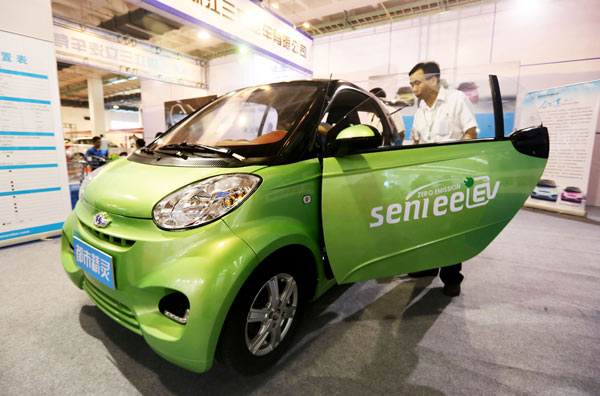 |
|
A man checks out an electric mobile at a new energy auto show in Beijing in July. The capital plans to tackle air pollution by promoting the use of green vehicles and cutting annual gasoline and diesel fuel consumption. [Photo/Xinhua] |
Beijing will actively promote the use of new energy and clean-energy vehicles to tackle air pollution.
According to the capital's five-year Clear Air Action Plan unveiled in September, authorities aim to cut annual gasoline and diesel fuel consumption in 2017 by 5 percent of 2012 levels.
At the end of 2017, the number of new energy and clean-energy vehicles will reach 200,000, the Beijing government said.
The city has 5.35 million registered vehicles and, according to the Beijing environmental protection bureau, these account for 22.2 percent of PM2.5.
It said 58 percent of nitrogen oxide and 40 percent of volatile organic compounds come from vehicle emissions.
To better implement the policy, the government should first choose new energy vehicles for public transportation, according to the capital's 2013-2017 plan.
Starting this year, authorities will work out a plan to encourage more people to buy and use new energy vehicles. The plan will be implemented in 2014.
In the municipal infrastructure area, more new energy vehicles and clean-energy vehicles will be developed as buses, taxis, postal vehicles, and sanitation trucks, according to the plan.
At the end of 2017, the proportion of new energy vehicles and clean-energy vehicles will reach 65 percent of the total number of buses in Beijing.
This could see gasoline and diesel fuel consumption reduced by 40 percent on 2012 levels among buses.
Support facilities
Power supplies and support facilities must be upgraded for green vehicles.
Commuters are still concerned about safety and repair issues, and called for more support policies.
The government vows to solve the problem in the five-year plan and asked a working office to plan for gas charging stations and battery charging stations this year.
Construction of these support facilities will start in 2014.
